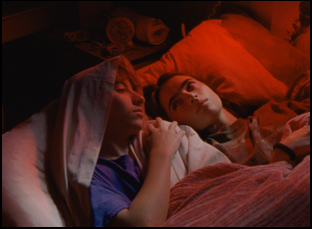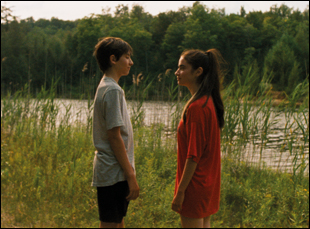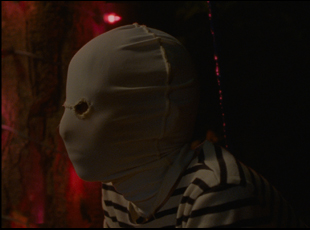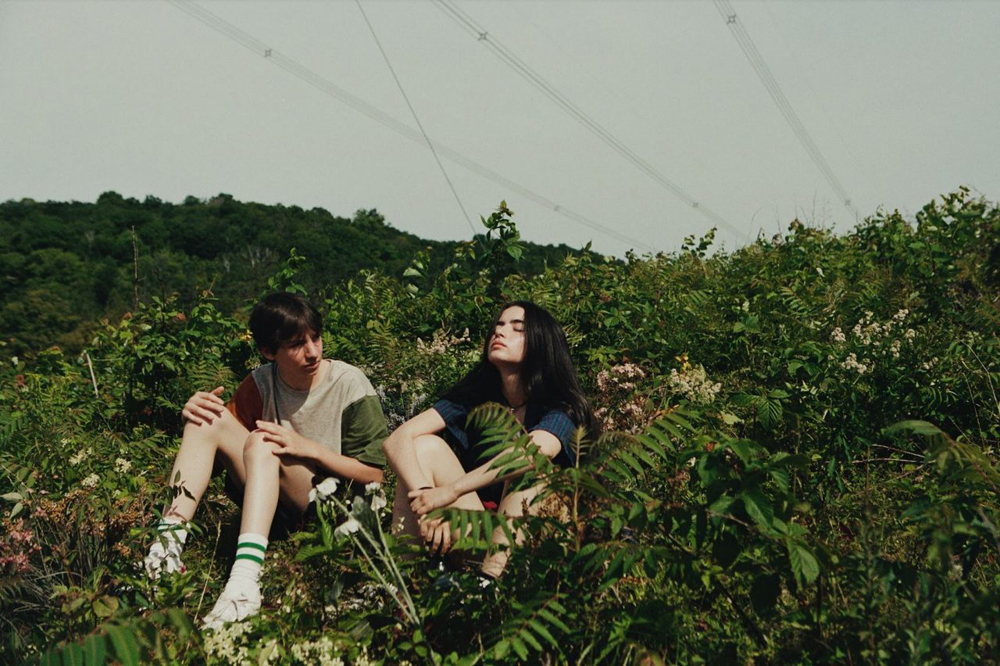“Your biggest fear is way cooler than mine,” Bastien (Joseph Engel) confides to Chloe (Sara Montpetit), the daughter of one of his parents’ longtime friends, in “Falcon Lake,” the kind of admiring admission that would speak to the three years between them at ages 13 and 16 respectively that feels as if it might as well be an eternity. Chloe would seem to have no fears at all, appearing easily bored by her surroundings after arriving at the summer home of Bastien’s family amidst the majestic Laurentian mountains in Quebec and above any shenanigans that Bastien has to endure while tending to his younger brother Titi (Thomas Lapierre). One might think she’d gravitate towards the local 19-year-olds who hang out by the water and party late into the evening with six packs, but Chloe doesn’t seem impressed by this crowd either and although she strikes fear into Bastien at first, introduced as if she’s the Bride of Frankenstein complete with lightning behind her when she sneaks into the bedroom they’ll share for the month in the middle of a rainy night and then posing a more abstract threat when puberty has had bewildering effects on both, the two grow closer than their adjoining beds would even allow for, with Bastien allowing her to stay in touch with her adolescence for just a little longer while she can make him feel a little more confident just by keeping him in her company.
If it seems impossible to carry the best qualities of childhood as one ages into a wisened adult, Charlotte Le Bon would seem to do just that in her staggering feature directorial debut, adapting Bastien Vives’ graphic novel “A Sister” about a fleeting encounter between teens into a tender and occasionally terrifying evocation of a time where a sympathetic ear can be hard to come by. With the adults in their lives having too much fun amongst one another to take notice, it feels as if Bastien and Chloe are in genuinely uncharted territory when neither has the experience to navigate the treacherous waters beyond the lake right in front of them, feeling the pressure of becoming sexual beings from both outsiders and their own burgeoning impulses that Keith feel entirely comfortable pursuing just yet. Le Bon marvelously approaches such sensitive subject matter with as much curiosity as the potential for disaster, and with performances from Engel and Montpetit that feel bracingly unguarded, the natural beauty to be found in “Falcon Lake” isn’t limited to its breathtaking scenery.
It also feels only natural that Le Bon has made such an accomplished feature in her first time out as a director, having accumulated a wealth of experience on sets as an actress in such films as “Fresh” and “The Walk” in addition to her offscreen artistic pursuits in sculpting, photography and painting that all seem to find their way into the finely crafted film. After earning a number of top prizes around the world following its premiere last year at Directors Fortnight at Cannes, the beguiling drama is touching down in American theaters this week and Le Bon generously spoke about not only her search for the perfect cottage for the film, but finding a home in filmmaking as well as finding her personal way into the story and the transcendent experience of working with sound.

Yes, because I come from visual arts and I’ve always wanted to tell stories through images, I think it was just something I was sleeping inside of me and then I started acting, but a little bit by mistake because it wasn’t something that I was pursuing precisely. It just happened and I decided to ride that wave and see where it would get me. But then I shot a lot of movies in a small amount of time and this became my technical school and to be also confronted with different directors’ opinions and vision and seeing the movies when they were done at the end and sometimes being disappointed with it. I remember at some point where I was just like, “I’m tired of being disappointed. I just have to try [myself].” And then this story just arrived and I’m not even a specific fan of coming of age movies, but this story just happened and usually in my life, it’s always like this, it’s not very planned. Something just happened and I decided to hold it and then go with it. That’s what happened with “Falcon Lake.”
It’s quite different than Bastien Vives’ graphic novel, but when your producer Jalil Lespert handed it to you, what did it unlock as far as thinking you could do something with it?
The ending, which is not the same ending in the movie, really, really stuck with me. This story just looked like a very anodyne story between a young boy and an older girl, but the end just took this darker and denser quality that I thought was really, really interesting and I remember reading it, I really liked the dialogue in the graphic novel because it felt really real and raw and I didn’t feel like [I heard] the author’s thoughts behind it. It was just very, very natural and organic, so I was completely taken by it and when I read the end, it just like this veil of darkness and density that held that story together — that was the starting point for me. I was like, “Oh, for sure, I want to do this.”
But then I started to write and I think I wrote the first version in a month-and-a-half and it was more loyal to the graphic novel. It was maybe reassuring for me to start from an already existing structure, but still, I couldn’t really find myself in the story and I didn’t understand why I wanted to do that story. But I just did it. And I sent it to my producers, and they [said], “It’s good, but there’s still a lot of work to do.” So I tried another version, and we couldn’t raise money. For a solid two years we couldn’t find money and at some point I [asked myself] why do I want to do this movie and it’s really when I closed the graphic novel and I put it in my library and I promised myself that I wouldn’t open it again that I started to fill it fill the the script with my own stories and and all of the elements that I like in cinema, which are [from] genre movies [that] I’m flirting with in “Falcon Lake.”

I was born in Montreal but I moved when I was 11 years old, and I grew up around lakes and forests. These landscapes were really the theater of my teenagehood and for me it’s completely linked to all of those very important and difficult years because I think being a teenager is really difficult and this was like evidence that I needed to transpose the story because the graphic novel takes place on the sea, and [with the] lakes in Canada, I thought there was something even more mysterious and darker. There’s this ambivalence in the landscapes here that I really like which is that lakes are could be very shiny on a sunny day and it looks like there are diamonds on the lake, but underneath it’s really, really dark and mysterious and you never know what’s in the bottom. That was a very interesting mirror to what’s happening when you fall in love for the first time because it’s really, really alluring and you want to touch it, but at the same time it’s so scary because it’s the first time.
Not only do you capture that sensitivity of the light, but the use of film stock really gives this a special texture. What was it like to decide on the right format?
We shot in super 16 millimeters [which] I shot my first my short movie in as well, and there’s something more grainy and organic that I really like [about it]. Sometimes in 35, especially now, because scanning now has become so powerful that we get almost a digital feeling [where] everything is so crisp, I feel like all the movies that I’ve watched when I was a teenager and I was a kid, when I discovered like the magic of cinema, everything was shot on film and there was still this soft veil on every images and this grainy feel. I really wanted to replicate that, maybe because I’m a nostalgic person, but I wanted this nostalgic quality to the image and because it is a movie on sensuality. I think the light looks better, the skin textures look better, and even in terms of colors because I come from visual arts, the darkness is different. All the range of colors that you can find in grading is so much richer and denser than in digital.
The other way this feels so lived in is the cottage where this is largely set. What was it like to find?
It was a very special story because we visited hundreds of houses and couldn’t find the right one. In the beginning, I wanted the perfect house on the perfect lake and we discovered that it was almost impossible to find, so we started to look for a perfect house and then find the perfect lake later. We started to distribute flyers in the area where we wanted to shoot, and this woman called the production and said, “I just lost my husband. It’s been a year. I have this house for you. I think it would be perfect.” So we came and it was filled with life, and I wanted the cabin to feel like there were a lot of different generations from the same family that lived there and left stuff from those different times. This woman stayed in that house for 20 years with her late husband, and she raised her kids in it and she did school in the house, so it was really filled with something special. And the house is really small and I was scared at the beginning that my set designer and my DP would say, “No, it’s too small, forget about it.” But they were both very, very optimistic and were like, “No, we feel that this is special. We need to work in it.” And I was like, “Okay, let’s go.”

Yeah, I feel like shooting in 16 really needs discipline and you need to know what you’re going to do. Even with my actors, it was really important for me to feel that they were completely in it and that they understood the heart of every scene. But as an actress I shot on film and on digital and what really gives the rhythm on set is the director because I’ve worked with directors that don’t really know what they’re doing so they put the cameras in so many different places and then you force your actors to play again and again and again and again and again the same scene and at some point the scene just dies a little bit. Because we had only 26 shooting days, I tried to be as minimal as possible in the shot list, so I’d shoot to be safe in the edit for sure, but I always tried on each take to do a perfect take because I [thought] if it works in the edit, I’m going to use just one shot. It was like a very fulfilling activity to do because you’re always trying to find solutions and you adapt constantly, and this is probably the most exciting part for me is trying to find ideas.
It sounds like you set such a wonderful environment for the actors. Was there anything that you were really conscious of giving them that you’d want from a director if you were in their shoes?
I always wanted them to feel safe and not judged when they were acting, which is something that I’ve probably gone through. There’s something very, very scary about acting. You’re completely naked and you’re constantly trying something and you’re obviously seeking approval in your director’s eye and it was really important for me that they would feel safe and secure and loved. That doesn’t mean I would say, “Oh, it was great” on each take, but more just, “Okay, this is good, this is good, but maybe you can add this or this,” and then they knew if I said, “Okay, moving on,” it was because I was really happy with the result.
There was also improvisation, and [for instance] there was a scene where [Bastien and Chloe] talking to each other around the lake when [Chloe] is asking him his worst fear and he’s saying that he’s jerking off in front of his parents. This scene was shot in one take and then in the edit we changed it a little bit, but each time it was shot in one take [because] I wanted them to improve and to be able to fill the little voids or add their little words or add their little expressions if they want, in order to feel very, very organic. This was early in the shoot, and because they were proposing stuff through improvisation, I think that there’s something really passive about being an actor and having to say other people’s words and when you’re creating and you’re giving something from you and it’s getting approved by your director, you feel useful and more active in the process, so this probably helped them to feel more confident and happy. They felt that they were part of this story and not just like marionettes.
Typically as an actor, you’ll often probably leave a set and other than maybe an ADR session, you move onto the next thing, but was it interesting to see the entire process through, especially when you can shape a film so much with elements like sound design?
What I really like about making movies is that you start, you’re completely alone with writing and then it becomes this huge collective experience where a lot of people are working together in order to create the story that you wanted to tell and then you become alone again with editing and sound design and everything. It feels more lonely, but you get so much time to just polish and I really see [the film] like an object that you find and you polish it again and again in order to feel completely perfect in order to give it to the world after.
I didn’t pay as much attention with sound in my short movie because we didn’t have time or enough money, but for “Falcon Lake,” it was my first time doing it and after I finished editing, I was supposed to start rehearsals for a play, and I’d never done theater, so I was obviously very anxious about it, but I was attracted to it because it was a beautiful project and it was in a beautiful theater in Paris. And people were saying to me, “You’ll be able to do your rehearsals and do sound at the same time. Sound doesn’t take that much time for directors. You just come and go and see and give notes.” So I said, “Okay, I’ve never done this, so I guess I believe you.” Then right before I started rehearsing, we started sound and I just discovered this world of possibility, all the stuff that you could add that would densify the story and the images. Then I started to be very anxious and [have] insomnia because I was like, “There’s no way I’ll be able to learn my lines for theater and do sound” because sound was taking so much space in my mind. So for two weeks, I couldn’t sleep and at some point, I made the decision I couldn’t do [the play] and I had to drop out of it 10 days before the beginning of rehearsals. I remember talking to the producer of the play [who said], “Sure, I’ve done movies. Usually, you can do both,” but I [said], I promise you I can’t, I need to be there every day. And that’s exactly what happened. I was there every day, doing sound editing, doing the mix, and I just discovered this world that is amazing and so creative. I know that undeniably my movie went to another level with sound.
“Falcon Lake” opens on June 2nd in New York at Metrograph, Los Angeles at the Monica Film Center and Lumiere Music Hall, Santa Ana at the Frida Cinema, Albuquerque at the Guild Cinema, Columbus, Ohio at the Gateway Film Center, Seattle at the Grand Illusion Cinema, Chicago at the Gene Siskel Film Center, Denver at the Sie Film Center and in Knoxville at the Central Cinema before expanding theatrically in the weeks to come. It will also be available on digital beginning June 13th.




